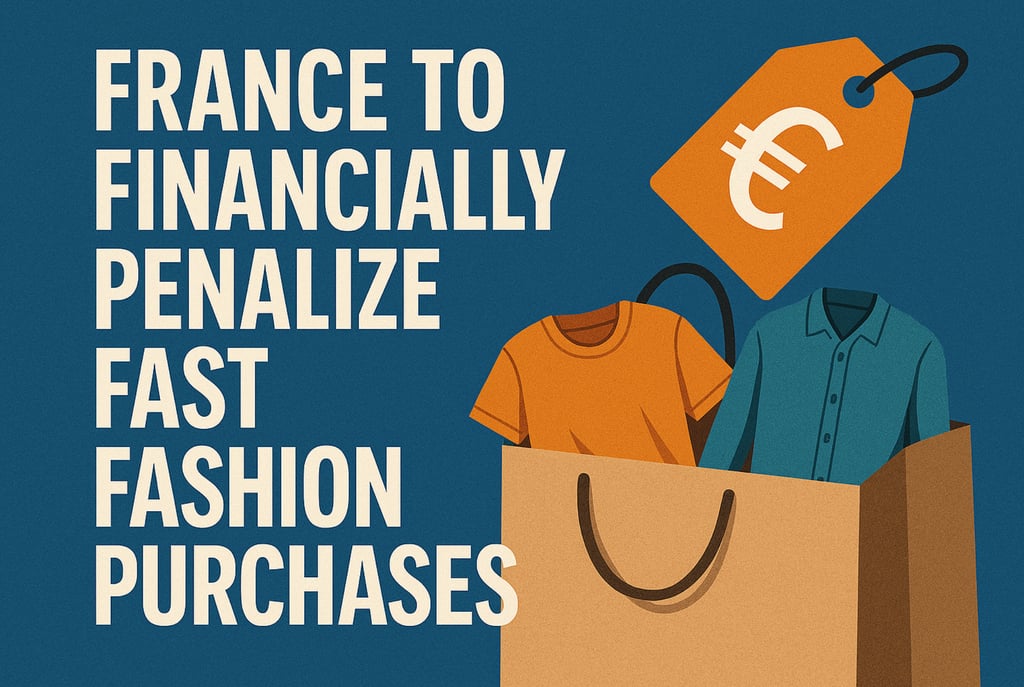France Takes a Bold Stand: What Their New Anti-Fast Fashion Law Means for You (and the Planet)
France has enacted a new law targeting fast fashion, introducing an eco-tax on cheap, high-volume items, banning their advertising, and requiring environmental scoring (eco-score) on clothing. This aims to curb overconsumption, promote sustainability, and protect local industry.
6/17/20253 min read


The fashion world is buzzing, and it's not just about the latest runway trends. France, a global leader in style, is now leading the charge against the environmental and social impacts of fast fashion. Their pioneering new law aims to curb the relentless cycle of cheap, disposable clothing, and it could have significant ripple effects far beyond French borders.
But what exactly is France doing, and how might it change the way we shop for clothes? Let's break it down.
The Problem with Fast Fashion: A Global Challenge
Before diving into France's solution, it's crucial to understand the problem. The rise of "fast fashion" – and more recently, "ultra-fast fashion" – has led to:
Massive Environmental Footprint: From excessive water usage and pesticide-laden cotton to synthetic fabrics shedding microplastics and mountains of textile waste in landfills, the environmental cost is staggering.
Ethical Concerns: The pressure for low prices often translates to poor working conditions and exploitation in garment factories, particularly in developing countries.
Culture of Overconsumption: The constant influx of new, inexpensive items encourages a "wear once, discard" mentality, devaluing clothing and contributing to waste.
France's Game-Changing Legislation: The Key Pillars
France's new law targets these issues head-on, with several innovative measures:
The Eco-Tax (Bonus-Malus System): This is perhaps the most talked-about aspect. From 2025, an environmental surcharge will be applied to ultra-fast fashion items. Starting at around €5 per item, it could rise to €10 by 2030, though capped at 50% of the product's price. The aim? To make consumers think twice about throwaway purchases and to fund initiatives supporting sustainable fashion.
Advertising and Influencer Ban: Imagine not seeing ads for ultra-fast fashion brands on your social media feeds or traditional channels. France is implementing a complete ban on such advertising, recognizing the powerful role marketing plays in driving overconsumption. This extends to influencers, who could face penalties for promoting these brands.
Mandatory Environmental Transparency (Eco-Score): Soon, you'll see an "eco-score" on clothing items, providing clear information about their environmental impact – from carbon emissions to recyclability. This empowers consumers to make more informed choices and incentivizes brands to improve their practices.
Defining "Ultra-Fast Fashion": The law specifically targets brands characterized by extremely rapid production cycles and the daily introduction of thousands of new products (think certain online retailers). This distinction aims to pinpoint the most egregious contributors to overproduction.
Why Now? The French Imperative
France's move is driven by a combination of factors:
Environmental Urgency: The sheer volume of textile waste and emissions can no longer be ignored.
Protecting Local Industry: The legislation also serves to level the playing field for French fashion houses and designers, who often cannot compete with the rock-bottom prices of ultra-fast fashion.
Shifting Consumer Behavior: By increasing costs and limiting advertising, France hopes to encourage more mindful consumption habits among its citizens.
What This Means for You (and UK Shoppers)
While this law is currently specific to France, its implications are far-reaching:
A European Ripple Effect? France's bold stance could inspire similar legislation across the European Union. The EU is already working on initiatives to reduce textile waste, and France's law could provide a blueprint.
Increased Awareness: Even if the law doesn't directly apply to the UK initially, the global discussion it sparks will heighten awareness about sustainable fashion and ethical sourcing.
Brands Adapting: Fast fashion brands, regardless of their primary market, may begin to adjust their strategies to align with growing regulatory pressures and consumer demand for more sustainable options.
The Rise of Conscious Consumption: This law strengthens the global movement towards buying less, buying better, and supporting brands committed to transparency and sustainability.
The Future of Fashion: Slower, Smarter, Sustainable?
France's new law marks a significant turning point in the fight against fast fashion. It sends a clear message that quality, ethics, and environmental responsibility should take precedence over endless newness and throwaway prices. As consumers, we have a vital role to play by supporting brands that prioritize sustainability and by embracing a more thoughtful approach to our wardrobes.
